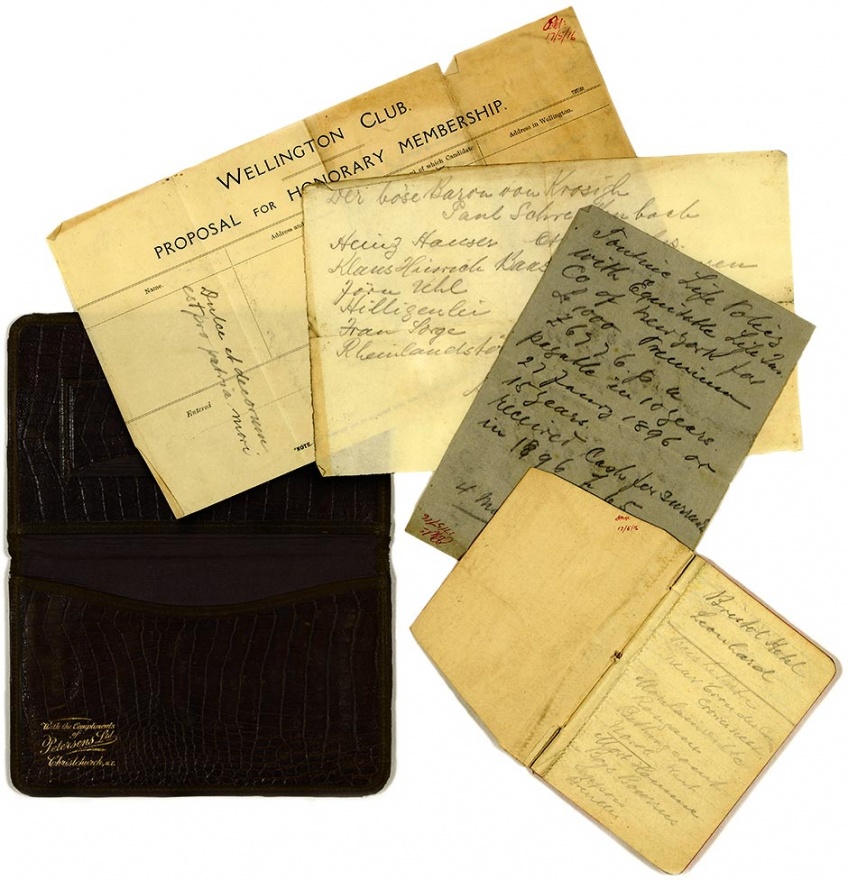
Wellington constables seized German-born merchant Eberhard Focke’s wallet when they arrested him in Wellington on 17 May 1916. The wallet, along with the scraps of paper it contained, remain in his internment file 100 years after his arrest. One of the notes bears the phrase, ‘dulce et decorum est pro patria mori’: it is sweet and glorious to die for your country.
Eberhard Focke (1852-1936)
Wartime censorship triggered a rapid decline in the fortunes of Eberhard Focke, a respected Wellington businessman and German consul. Born in Bremen, Germany, in 1852, Focke moved to London in 1873 and from there to New Zealand in 1879. He formed a partnership with fellow German A.F. Castendyk in 1884. Castendyk and Focke traded in wines, spirits and general merchandise through much of the lower North Island from their Wellington headquarters.
Focke replaced his business partner as Wellington vice-consul for Germany after Castendyk’s death in November 1897. A consul represented German interests in each of New Zealand’s four main centres, under the general supervision of a consul-general based in Sydney. Focke, who became a naturalised New Zealand citizen in October 1893, conducted his consulate duties from his Wellington business premises.
Focke and his fellow consuls, the enemy’s official intermediaries, were in a precarious position when war was declared in August 1914. Were they friends or enemies? Focke had been well-liked, and most people were prepared to give him the benefit of the doubt, at least initially. Someone smashed his office windows and levered the brass consulate sign off his door, but sympathetic non-German friends quickly paid for the damage to be repaired.
The government suspended the work of German consuls and seized their official papers, but Focke continued to support the local German community in an informal capacity. He worked with Wellington Mayor J.P. Luke and the former consuls in other New Zealand centres to support the families of German nationals imprisoned on Somes Island. He visited the prisoners and acted as their informal representative on the mainland.
The tide began to turn for Focke in November 1914, when the Sydney censor intercepted a letter he had written in violation of the ban on corresponding with enemy nations. The content was innocuous – Focke was telling his brother that they would not be able to correspond during the war – but the Minister of Justice ordered his immediate arrest. The Wellington police placed him in custody on 26 November.
Solicitor-General J.W. Salmond, the senior lawyer in the public service, concluded that though there was no evidence on which to base a conviction, Focke should be retained in custody indefinitely. Despatched to Somes Island, he protested his innocence and complained about the conditions. His health soon suffered, and after reviewing the case Salmond took a lenient view and allowed him indefinite parole from January 1915.
Focke remained at home with his family until early 1916, when Cabinet, apparently under public pressure, ordered that he be re-interned on Somes Island if his health permitted. Wellington constables arrested him in Chews Lane on 17 May. His file shows that he continued to work for the welfare of other prisoners, whose anti-British sentiments prevented him working overtly with the authorities.
Focke’s fortunes continued to decline. His initial arrest had reduced his ability to get credit for his business, and in July 1916 the Crown Law Office banned Castendyk and Focke from engaging in foreign trade – a crippling blow for an importing firm. In June 1918 the government revoked his naturalisation.
Focke was not released until December 1919. With his business now defunct, Focke and his wife settled in Te Awamutu with their son. In 1929 the government refused his application to have his naturalisation restored – and the German authorities declined him citizenship. To enable him to travel to Honolulu, Internal Affairs issued Focke a ‘certificate of identity’ that declared him to be ‘without nationality.’ Eberhard Focke died in 1936 at the age of 83.

Community contributions